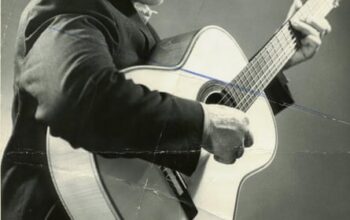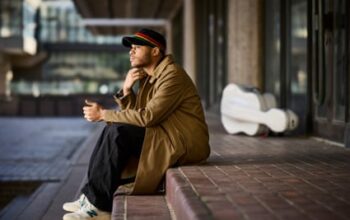For anyone with a love of early-2000s R&B and hip-hop, the line-up poster for this year’s Lovers & Friends festival in Las Vegas is a dreamland. Janet Jackson, Usher, Alicia Keys, Nelly, Ludacris, Gwen Stefani and Lil Wayne are among the big-name acts at the top of the poster with Craig David, Brandy, Monica, Eve and Sean Paul lower down. The fact it was planned as a one-day event meant it would be impossible to see all the big names.
The most common question fans ask when they first hear about the festival is whether it’s even real or a convincing poster made on Photoshop. Lumidee, whose song Never Leave You (Uh Oooh, Uh Oooh) is a staple of any R&B playlist, says she only believed last year’s Lovers & Friends was real when the deposit from the organizers landed in her bank account. “My mama said, ‘It’s not real,’ and I was like, ‘I think it is,’” she jokes.
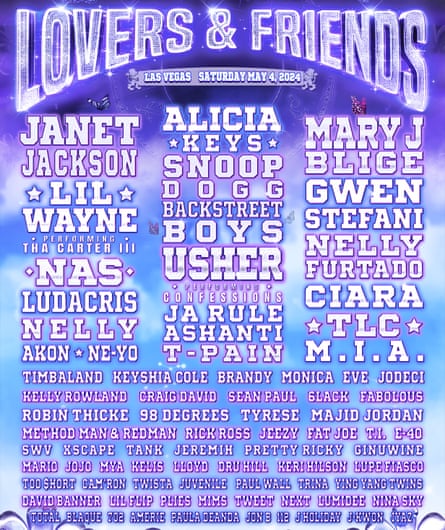
“It’s crazy backstage,” Lumidee says, recalling last year’s event. “I ran into Lil’ Mo and Omarion, who I hadn’t seen since 2003. Boyz II Men were there, too. It’s hard not to be a fan when so many of your heroes are in the same place.” She adds with a laugh: “Everyone was looking great. We’ve all held up really well.”
She had been due to perform again at this year’s event in May before it was dramatically canceled on the day due to bad weather. Organizers took the “incredibly heartbreaking” decision on the advice of public officials and the National Weather Service, which warned of high winds and “gusts potentially more than 60mph”. Ticket holders and some performers, many of whom had traveled to Las Vegas specially, were only told on the morning of the festival.
Lovers & Friends is one of a number of new festivals across the United States designed to serve nostalgic music fans: those who remember the era as well as those jealous that they missed out. A California festival, Just Like Heaven, revives the Pitchfork-approved height of the mid-2000s indie era while the aptly named When We Were Young will bring hordes of emo and pop-punk fans to Las Vegas this October to see My Chemical Romance, Fall Out Boy and Jimmy Eat World.
When We Were Young and Just Like Heaven both launched in 2022 and target elder-millennial audiences. They are the people with disposable income who find themselves ageing out of the reflex of keeping up with new music. There are boomer-fied nostalgia festivals, too, though. August’s Fool in Love is a celebration of R&B headlined by Lionel Richie and Diana Ross while No Values asks ageing punks to squeeze into their black drainpipe jeans and pogo to Black Flag, Bad Religion and Iggy Pop.
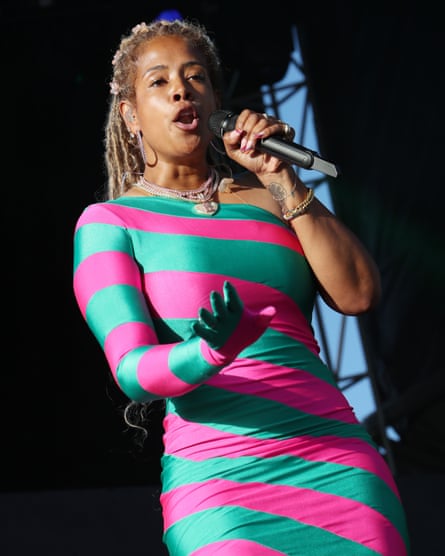
“Just Like Heaven was awesome,” says Lindsay Knight, 36, who attended this year’s festival to see the headliners Death Cab for Cutie and Phoenix. “The crowd was super friendly and welcoming to all of the bands. I went with a friend from high school and we got to see so many of the artists we grew up listening to. To be honest, we never stopped listening to them.”
While there have been plenty of independent music festivals dedicated to one genre or style, this opportunity to cosplay a past time or scene is relatively new. All of the throwback events in this article are put together by just two companies: Goldenvoice (which is owned by the live entertainment giant AEG) and Live Nation. Both Goldenvoice and Live Nation declined to comment but Jesse Fayne, VP of international festivals at the talent agency Wasserman, says events with unique selling points are increasingly attractive during a time of “market correction” in the festival marketplace.
“Genre-based and community-led events will persevere and be able to run through any wider issues,” he says. He points to a Deftones and System of a Down open-air event in San Francisco this summer that sold 50,000 tickets in 24 hours and sold out. “If I’m a System of a Down fan, then that’s the event I’m going to be at,” he says. “I’m going to be with the people that look, talk and act like me. I know I’ll have a great time.”
It all speaks to the changing face of nostalgia. There was a time when this kind of thing might have been much less high-profile, perhaps taking place on a cruise ship (where bands like Weezer, Creed and Flogging Molly have long performed gigs to captive crowds of superfans). But a decade-plus of the streaming revolution has had a flattening effect on musical eras and what is perceived as “old”.
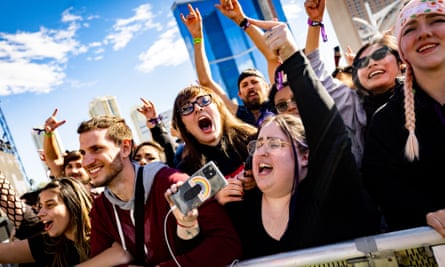
According to Luminate’s year-end music report, catalog music, as opposed to new releases, accounted for 72.6% of album consumption in the United States last year. Spotify’s All Out decade playlists (All Out 90s, 80s, etc) boast millions of followers. More people listening to catalog music has created a market for publishing rights worth billions. Now festivals, like streaming platforms, are finding out that many fans are more interested in golden oldies than new acts.
In 2022, the 125,000 tickets for Coachella’s first weekend were snapped up in 40 minutes. This year, it took Goldenvoice 27 days to shift the same number. Just before the 2024 festival, Billboard reported that approximately 80% of the 250,000 tickets available for purchase had been sold, representing a 14%-17% fall year-on-year. In contrast, Lovers & Friends and When We Were Young both sold out immediately, with Live Nation adding a second date for the latter.
The industry hasn’t reached a consensus on the reasons for the decline in more contemporary pop festivals. Some point to the rising cost of tickets, travel and accommodation while others point to a lack of A-list headliners. Coachella in 2022 was headlined by Harry Styles, who subsequently spent two summers on his own stadium tour. Artists such as Styles, Taylor Swift and Beyoncé are no longer inclined to headline festivals when greater creative control and a bigger bottom line are available under their own names. This leaves festival promoters on an awkward middle ground. “The general-interest festival [such as Coachella and Governors Ball] has to pivot,” Fayne adds, suggesting that festivals need to take risks on first-time headliners, mentioning the relatively new singer Chappell Roan as an example.
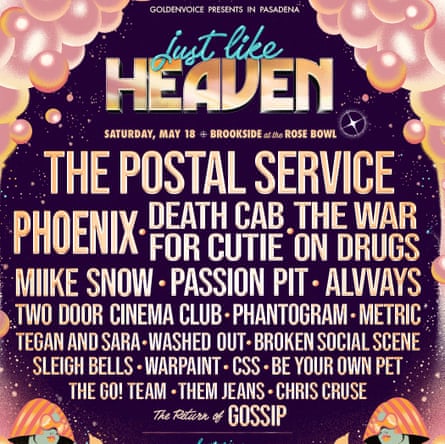
Festivals like Coachella and Lollapalooza have always offered fans some nostalgia, too, with perennial headline acts such as the Killers and Foo Fighters naturally relying on decades-old songs for the biggest moments in their sets. No Doubt, for example, were paid a reported $10m to reunite and play Coachella this year. Forcing the past on unsuspecting audiences isn’t a surefire hit, though, as Blur’s disastrous appearance goes to show: the band were left performing their usually triumphant 90s hits to an unenthusiastic audience waiting for the headliner Tyler, the Creator. “You’ll never see us again,” Damon Albarn said in a show of frustration, seemingly forgetting the festival is staged over two weekends and he was due back in a week’s time.
That’s another reason heritage acts might rather play themed festivals like Lovers & Friends: more curated line-ups should help create a better synergy between performers and audience and hopefully help avoid the blank stares and muted applause handed out to Albarn. They also work for artists lower down the chain as they contend with the eye-watering cost of playing live in 2024. “A festival always anchors a tour, so every band tries to tour around festival dates,” says Ana Rezende of the nu-rave group CSS, who played Just Like Heaven and will be touring the US and UK this summer to celebrate the 20th anniversary of their debut album. “That’s the reality if you’re doing a reunion or if you’re a brand-new band.”
Rezende called the live-music industry unsustainable – which feels like the elephant in the room. Looking back is fun but it also revives some of the same issues of diversity and inclusivity that plagued past line-ups, while furthering the “pipeline problem” organizers have been warning against for years – essentially, that there aren’t good ways for a new act to get on the headliner track.
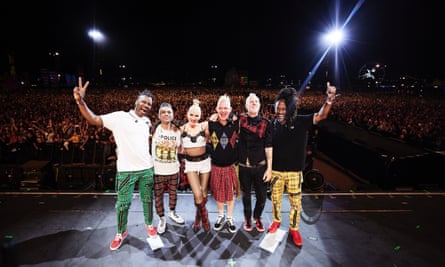
In 2023, Emily Eavis, co-organizer of the UK’s Glastonbury festival, said the festival’s all-male line-up of headliners that year (Arctic Monkeys, Guns & Roses and Elton John – all varying degrees of vintage) was reflective of a wider problem in the music industry and called on record companies to invest in more female musicians.
In other words, there will be no nostalgia in the future if the present is not properly tended to. But if the way people listen to music has fundamentally changed (many TikTok hits are used largely as background music to another activity, for example) then it makes commercial, if not artistic, sense to target those who remember the way it used to be.
Source: theguardian.com
